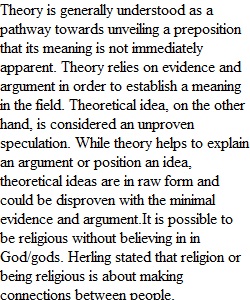


Q 1. How is the word "theory" generally understood? What is the difference between theories of the natural world and "theoretical ideas" in the academic study of religion? 2. According to Herling, is it possible for someone to be "religious" if he or she doesn't believe in God/gods? Why or why not? 3. According to Herling, what is the difference between substantive and functionalist definitions? Which seems more appropriate for the study of religion, and why? 4. According to Herling, what is the relationship between definition and description in the study of religion? 5. Drawing on Herling, what's an example of a definition of religion that runs the risk of reductionism? Why? What, if anything, is wrong with reductionism? 6. In reference to Herling, does religion make it particularly difficult to understand the perspective of the insider? Who understands religion better: the insider or the outsider? 7. According to Herling, what, in general, is the relationship between theology and religious studies? Should theology be excluded from the academic study of religion? Why or why not? 8. According to Martin, what is the basic idea behind social constructionism? Why does Martin say that if we use different concepts, we get different results? 9. Discuss Martin’s seven key principles of social constructionism. In detail, discuss what they are, using examples throughout. (Note: this question will likely require a longer answer.) 10. How does essentialism work, according to Martin? What are the problems with essentialism? PreviousNext
View Related Questions